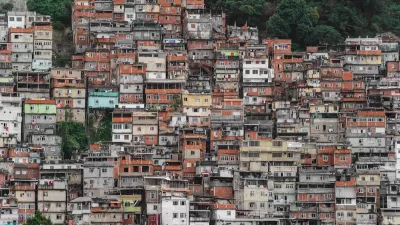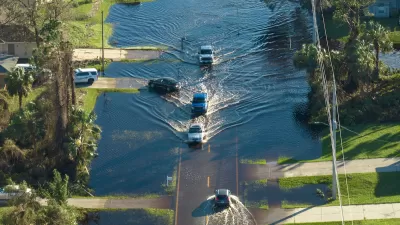The time to start preparing for mass migration spurred by climate change is already here.

"Climate change impacts are projected to displace 216 million people in developing regions by 2050," reports Tim McDonnell.
That's the conclusion of a new report from the World Bank, which predicts that sea-level rise and water scarcity will be the primary driving force of climate-related displacement—some of which will occur within the borders of existing countries and even within city limits.
"As early as 2030, cities like Cairo, Hanoi, Dhaka, Tashkent could become climate immigration hotspots. The latest report, which focuses primarily on North Africa, East Asia, and Central Asia, builds on a document from 2018 that focused on sub-Saharan Africa, Latin America, and South Asia," explains McDonnell.
The World Bank report echoes the findings of the Intergovernmental Panel on Climate Change report from August of this year, saying that every degree of warming that can be mitigated through emission reductions will have an impact on the number of migrants later in the century—and the conditions they will face as they move around their countries.
"People move around anyway, and urbanization has been growing for decades," writes McDonnell. "The challenge, highlighted by the report, is to ensure that destination locations are ready, with safe, affordable housing, employment opportunities, and sufficient public services for a growing population."
FULL STORY: The World Bank says climate change could displace more than 200 million people

Planetizen Federal Action Tracker
A weekly monitor of how Trump’s orders and actions are impacting planners and planning in America.

Congressman Proposes Bill to Rename DC Metro “Trump Train”
The Make Autorail Great Again Act would withhold federal funding to the system until the Washington Metropolitan Area Transit Authority (WMATA), rebrands as the Washington Metropolitan Authority for Greater Access (WMAGA).

The Simple Legislative Tool Transforming Vacant Downtowns
In California, Michigan and Georgia, an easy win is bringing dollars — and delight — back to city centers.

The States Losing Rural Delivery Rooms at an Alarming Pace
In some states, as few as 9% of rural hospitals still deliver babies. As a result, rising pre-term births, no adequate pre-term care and "harrowing" close calls are a growing reality.

The Small South Asian Republic Going all in on EVs
Thanks to one simple policy change less than five years ago, 65% of new cars in this Himalayan country are now electric.

DC Backpedals on Bike Lane Protection, Swaps Barriers for Paint
Citing aesthetic concerns, the city is removing the concrete barriers and flexposts that once separated Arizona Avenue cyclists from motor vehicles.
Urban Design for Planners 1: Software Tools
This six-course series explores essential urban design concepts using open source software and equips planners with the tools they need to participate fully in the urban design process.
Planning for Universal Design
Learn the tools for implementing Universal Design in planning regulations.
Smith Gee Studio
City of Charlotte
City of Camden Redevelopment Agency
City of Astoria
Transportation Research & Education Center (TREC) at Portland State University
US High Speed Rail Association
City of Camden Redevelopment Agency
Municipality of Princeton (NJ)





























